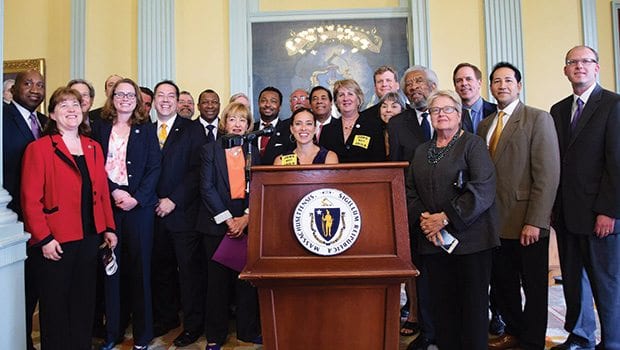
Prior to a Joint Committee on Judiciary public hearing, legislators, public safety officials, advocates, and community members joined together at a press conference on Tuesday to voice the need for comprehensive criminal justice reform in the Commonwealth.
Those present included state Rep. Mary Keefe (Worcester) and Senator Sonia Chang-Díaz (Suffolk) who spoke on their jointly filed bill, the Justice Reinvestment Act (S. 64/ H. 1429).
“Our criminal justice system is currently costing taxpayers $53,000 per year per incarcerated person without the kind of returns taxpayers should expect for that kind of money,” Chang-Díaz said. “Compare that to an average per pupil expenditure of just over $14,000. This math does not work for taxpayers or for the safety of our communities.”
“The Justice Reinvestment Act at its core is about re-examining our priorities,” Keefe said. “We need to stop focusing on severing connections between people and isolating individuals through incarceration and stigmatization, and refocus our efforts on reconnecting and strengthening ties within our community, and one way to do so is through gainful employment. Our work lives are one of the important ways that keeps us accountable in society and connected to our community.”
Also joining were state Sen. Cynthia Creem (Newton) and state Rep. Benjamin Swan (Springfield) who spoke on their bill, An Act Eliminating Mandatory Minimum Sentences Related to Drug Offenses (S. 786/H. 1620).
“Mandatory sentencing for drug offenses is economically unsustainable in terms of cost to the public; and morally indefensible in the context of a just society,” Swann said.
Additionally, Suffolk County Sheriff Steve Tompkins, community advocates, and survivors of crime spoke on the need for a criminal justice system that better serves the community and the goal of public safety.
“Unless we reinvest in the communities that have been targeted, its members will be trapped in a permanent underclass,” said Nicholas Ventura a member of the state-wide social justice organizing group Neighbor to Neighbor. “Massachusetts is supposed to be a progressive leader, but we are behind Rhode Island, New York, Michigan, and Ohio when it comes to mandatory minimums.”






